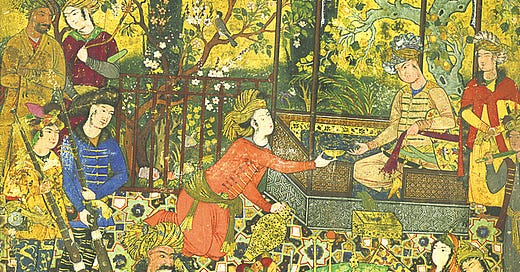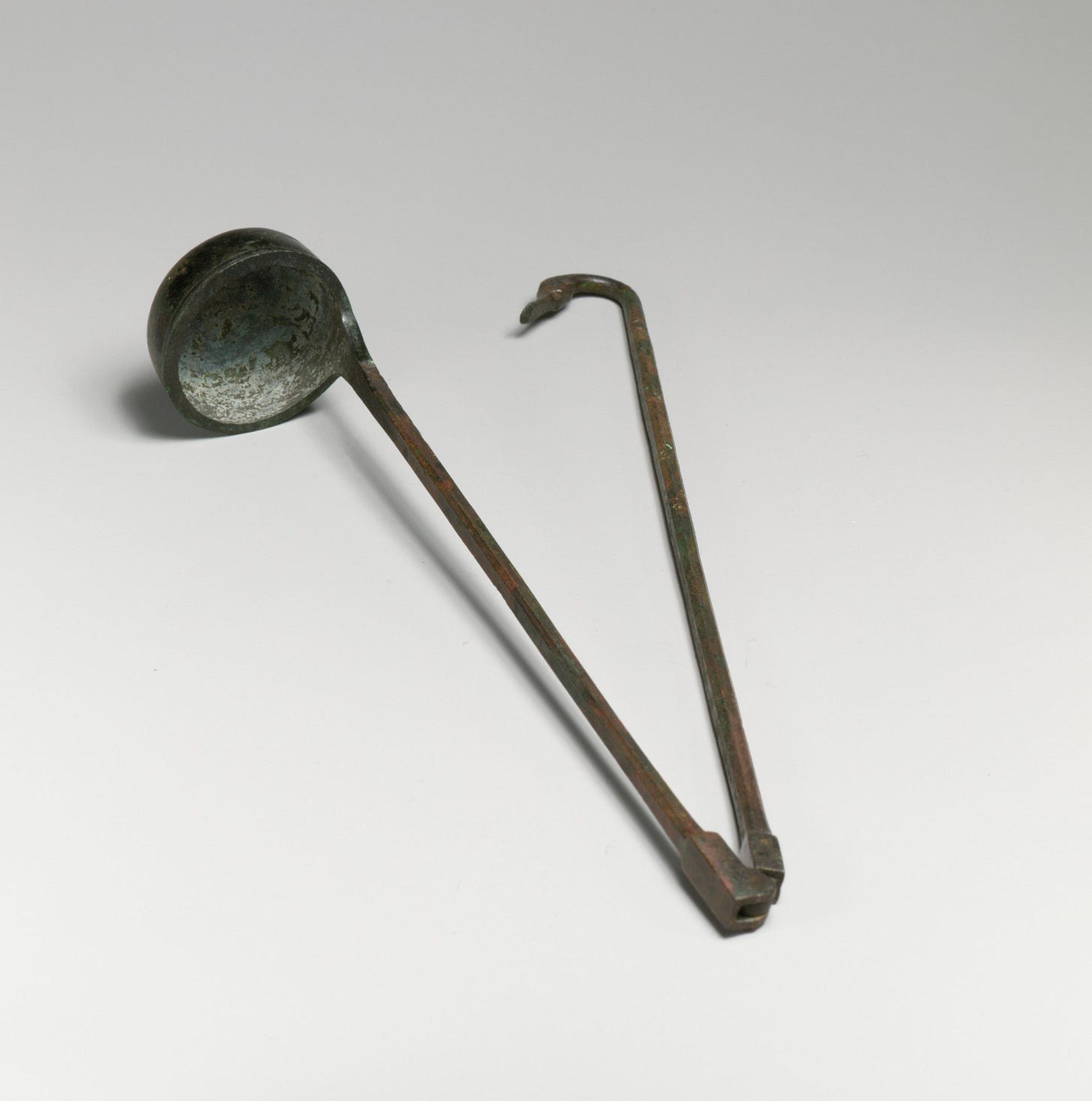🌟 Paradise [3]: Uqaishar As-Saadi & A Wordly Drinkers' Scant Knowledge of The Gifts of Paradise
A Poet Lost to Time; Reaches us Through One of His Couplets Here
transliteration:
Afnā tilādī, wa mā jammaʿtu min nashabīn
Qarʿu al-qawāzīzi afwāha al-abārīqi.
“ All the wealth I’ve hoarded up, Is nought to the clinkling ladles of the brimming cup
that rings on the edge of a wine jar’s lips ”
“Uqaishar1 As Saadi2. ‘ What is he? & What is his wine? ’ He placed his bet on a bad horse in the event! If he had seen the celestial cups, he would have realized that he had lived a hollow dream. & that he had rejoiced without cause.
Wretched until Judgement Day he may still repent when his skin is rent. Sad that his Hopes have passed.”
(continued at end)
🔵 Understanding The Arabic Words In Context:
أفنى (ʾAfnā) – [He/it] annihilated, destroyed, depleted – classical root f-n-y, meaning to exhaust or bring to end.3
تِلادِي (tilādī) – my ancient wealth, typically inherited property or legacy; from t-l-d, contrasting with acquired wealth (nashab).
وما جمعت (wa mā jammaʿtu) – and whatever I had gathered; verb j-m-ʿ meaning to accumulate or collect.
من نشب (min nashabī) – of my gains/acquisitions; nashab = movable acquired property, as opposed to tilād.
قرع (qarʿu) – the striking sound, used of hitting or knocking — onomatopoetic4.
القوازير (al-qawāzīz) – ladles or metal dippers, used to draw water or drink5.
أفواه (afwāha) – mouths, plural of fū, literally “orifices/openings”.
الأباريق (al-abārīq) – pitchers/jugs, vessels with spouts, often associated with luxury and pouring drink.
🟢 Intricacies of the Verse:
Theme: There is a theme here with the couplet expresses the speaker's lamentation over the loss of their legacy and wealth — both inherited (tilād) and earned (nashab).
Imagery: Vividly grounded in sound — the clinking of ladles (qawāzīz) on jug mouths (abwāb al-abārīq)— symbolizing habitual pouring, revelry, or perhaps wasteful luxury... Also coming with a symbolism of the sound.
Tone: Regretful, almost resigned; it blends personal grief with social critique.
Structure: Split into two clear hemistichs — cause and effect:
1st: What has been lost
2nd: What caused it
There is Tilād vs. Nashab: This deliberate juxtaposition highlights both ancestral and personal losses, encompassing total depletion with an inference to Social Satire, critique indulgence in wine (or metaphorically, heedless pleasure) that drains wealth.
🔘 Root Analysis and Their Classical Usages:
🟡 Identifying the Meter (البحر الشعري):
1st Hemistich (ṣadr):
أَفْنَى تِلادِي، وَمَا جَمَّعْتُ مِن نَشَبِ
afnā tilādī | wa-mā jammaʿtu | min nashabi
مُتَفَاعِلُنْ | مُتَفَاعِلُنْ | مُتَفَاعِلُنْ
ـــ ⏑ ـــ | ـــ ⏑ ـــ | ـــ ⏑ ـــ
2nd Hemistich (ʿajuz):
قَرْعُ الْقَوَازِيزِ أَفْوَاهَ الْأَبَارِيقِ
qarʿul-qawāzīzi | afwāhal-abārīqi
مُتَفَاعِلُنْ | مُتَفَاعِلُنْ | مُتَفَاعِلُنْ
ـــ ⏑ ـــ | ـــ ⏑ ـــ | ـــ ⏑ ـــ
The verse is in Baḥr al-Kāmil, with elegant and regular foot divisions with no Zuhafs and Illals. (I plan to add notes on Bahrs in future so keep an eye out for that).
🌟 Forthcoming
“How many vessels are here by the River made of Chrysolite & Ruby — Yellow, Red & Blue — so bright that one would think that their touch would burn, as was said by As - Sanobari الصَّنوبَري . The couplet which we will look at next time”
Al-Uqayshar al-Saʿdī (Arabic: العُقَيْشِر السَّعْدِي) was a pre-Islamic (Jāhilī) poet from the Saʿd tribe. He is considered an obscure figure in Arabic literary history, with limited surviving works. Due to the scarcity of information, al-Uqayshar al-Saʿdī is not prominently featured in major anthologies like the Muʿallaqāt or Mufaḍḍaliyāt, which focus on more renowned poets. His recognition primarily stems from brief mentions in works like Risālat al-Ghufrān. I was unable to find anything beyond this. If someone may have any knowledge regarding this, it would be wonderful and appreciable.
The Banu Sa'd (Arabic: بنو سعد / ALA-LC: Banū Saʿd) was one of the leading royal tribes of Arabia during the Prophet Muhammad's (PBUH)’s era. They were a subgroup of the larger Hawazin tribal confederation. They apparently had close family relations with Banu Hashim. Halima Sadia, Prophet Muhammad's wet nurse, also belonged to this tribe.
You may have heard sufis use the term ‘Fanaa’. Fanaa fil’Lah meaning literally to (Dissolve in God). Also Fanaa vs Baqaa i.e the temporary (faani) world against the Eternal which can either be God, or can also be used to refer to Hereafter in the Abrahamic Eschatology. i.e Man’s Eternal Abode.
The formation or use of words such as buzz or murmur that imitate the sounds associated with the objects or actions they refer to. Here it is the sound of hitting or knocking







